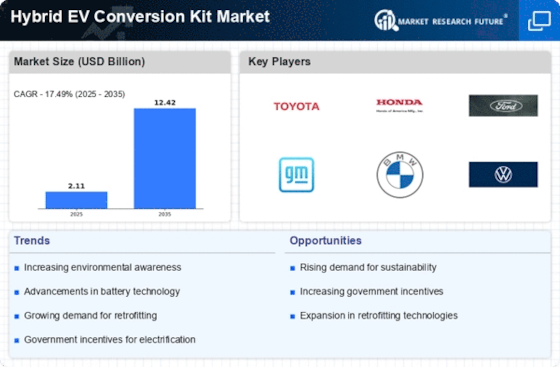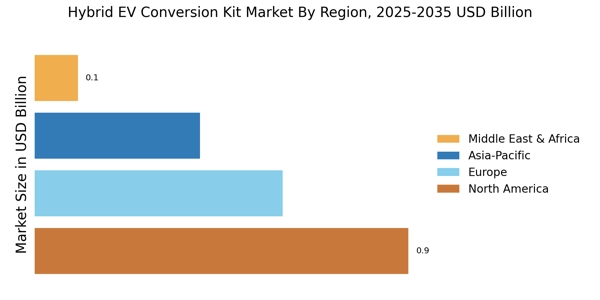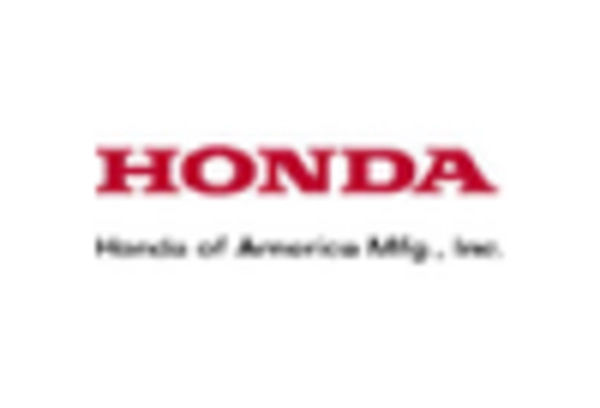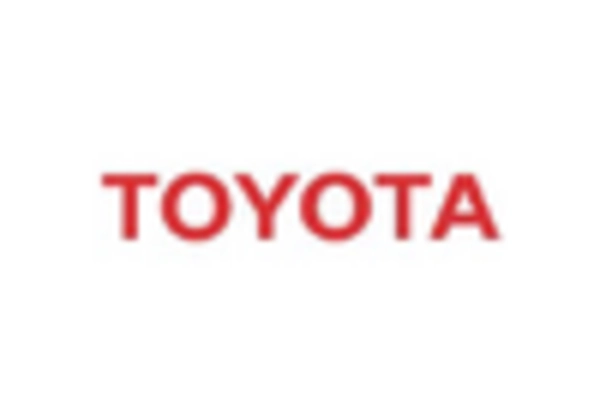North America : Innovation and Adoption Leader
North America is poised to dominate the Hybrid EV Conversion Kit Market, driven by increasing environmental regulations and consumer demand for sustainable transportation. The region holds approximately 45% of the global market share, with the United States being the largest contributor, followed by Canada at around 15%. Government incentives and tax rebates for hybrid vehicles are further catalyzing market growth, making it a key area for investment and innovation. The competitive landscape is robust, featuring major players like Ford, General Motors, and Toyota, who are actively developing advanced hybrid technologies. The presence of established automotive manufacturers and a growing number of startups focused on EV solutions are enhancing market dynamics. Additionally, partnerships between automakers and tech companies are expected to accelerate the development of hybrid conversion kits, ensuring North America's leadership in this sector.
Europe : Sustainability and Regulation Focus
Europe is rapidly emerging as a significant player in the Hybrid EV Conversion Kit Market, driven by stringent environmental regulations and a strong commitment to reducing carbon emissions. The region accounts for approximately 30% of the global market share, with Germany and France leading the charge. The European Union's Green Deal and various national policies are incentivizing the adoption of hybrid technologies, creating a favorable environment for market growth. Key players in Europe include BMW, Volkswagen, and Porsche, who are investing heavily in hybrid technology and innovation. The competitive landscape is characterized by collaborations between automotive manufacturers and technology firms, aimed at enhancing the efficiency and performance of hybrid systems. As consumer awareness of sustainability increases, the demand for hybrid conversion kits is expected to rise, further solidifying Europe's position in the market.
Asia-Pacific : Emerging Market Potential
Asia-Pacific is witnessing a significant surge in the Hybrid EV Conversion Kit Market, fueled by rapid urbanization and increasing environmental awareness. The region holds about 20% of the global market share, with Japan and South Korea being the largest markets. Government initiatives promoting electric and hybrid vehicles, along with investments in charging infrastructure, are key drivers of this growth, making the region a focal point for hybrid technology development. Leading countries like Japan and South Korea are home to major automotive manufacturers such as Honda, Nissan, and Hyundai, who are actively expanding their hybrid offerings. The competitive landscape is evolving, with both established players and new entrants focusing on innovative solutions to meet growing consumer demand. As the region continues to embrace sustainable transportation, the hybrid conversion kit market is expected to flourish, supported by favorable policies and technological advancements.
Middle East and Africa : Resource-Rich and Emerging Market
The Middle East and Africa region is gradually emerging in the Hybrid EV Conversion Kit Market, driven by increasing awareness of environmental issues and the need for sustainable transportation solutions. The region currently holds about 5% of the global market share, with South Africa and the UAE leading the way. Government initiatives aimed at diversifying energy sources and reducing reliance on fossil fuels are catalyzing the adoption of hybrid technologies in these markets. In South Africa, local manufacturers are beginning to explore hybrid solutions, while the UAE is investing in infrastructure to support electric and hybrid vehicles. The competitive landscape is still developing, with opportunities for both local and international players to enter the market. As the region continues to evolve, the demand for hybrid conversion kits is expected to grow, supported by favorable regulations and increasing consumer interest in sustainable mobility.
















